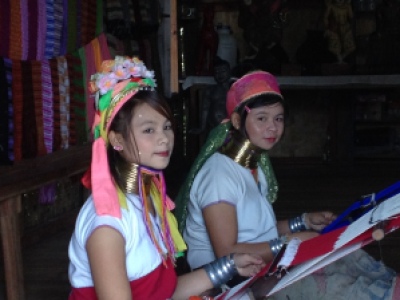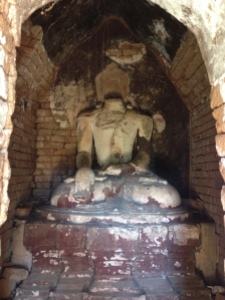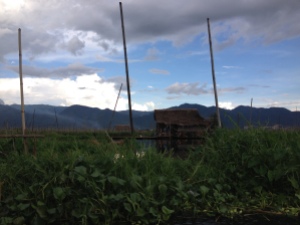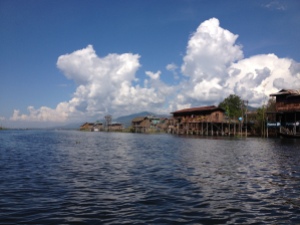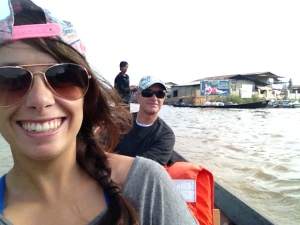 I’m woken to the sound of boats starting their engines to make the journey down the river into Inle Lake. The constant drone is dulled by my mountain view room in Inle Star Motel, but still I stir and climb up to the rooftop terrace for breakfast. From here I watch as other travellers make their way to the dock to barter for the best price lake tour. Knowing the treasures the lake has in store, it doesn’t take much to tempt me to head out for the day too.
I’m woken to the sound of boats starting their engines to make the journey down the river into Inle Lake. The constant drone is dulled by my mountain view room in Inle Star Motel, but still I stir and climb up to the rooftop terrace for breakfast. From here I watch as other travellers make their way to the dock to barter for the best price lake tour. Knowing the treasures the lake has in store, it doesn’t take much to tempt me to head out for the day too.
The Inle Star Motel provides its own tour service and for 18 500 Myanmar Kyat (approx $18.50 USD) we are sent out to meet their driver and our guide for the day, Kyawthu. Kyawthu is a born and bred local from the Inle region whose father also runs his own boat tours, so he is knowledgeable about all things regarding the lake and lake life.
We board our longboat. Kyawthu has laid out pillows on our chairs and has umbrellas ready to protect us from the sun’s strength. Before long I learn that Kyawthu knows absolutely everyone on the lake: every driver, every store owner and every local resident, and we feel as if we are experiencing the everyday life of the Myanmar people who live on the lake.
Naturally we make the tourist stops to witness traditional crafts with the option to purchase from the adjoining stores. Win Yadanar is a local store on the lake and our first stop, where traditional silk weaving is carried out by girls from the Kayan (Paudang) tribe. The tribe moved to the lake for peace after political tensions escalated in their former province. Similar to the long neck tribes in Thailand, I was shocked to learn of the weight the gold chains that create the elongated neck appearance. Girls from six years of age adorn 4kg of gold. From 14 years this increases to 2kg and once they reach 20 the weight is 8kg. No wonder their collarbones are pushed down to make the neck appear elongated. The girls sit dutifully, weaving as tourists take photos. A small scarf takes 7 days to weave and a long one a total of 11 days. Prices start from around $20USD.
After learning about the girls, we are taken to a series of pagodas perched above a monastery. Buddhas have lost heads and the walls are crumbling. Young boys try to charge us money as they follow us up to the pagodas, claiming they are our guides. The topmost pagoda looks like a daunting climb in the Myanmar heat, but we scale the short steep staircase easily. Gratefully, it is well shaded. I am mesmerised by the views out over Inle Lake and the communities that appear to be floating in its waters.
Eager to get back out in the water, I jump aboard the longboat and Kyawthu takes us to Special Fish – Gold, Silversmith and Workshop. This family, another friend of our trusty guide, are the traditional silversmiths of the region with all their supplies coming from their own mine in the mountains. The family all work in the workshop and store, where you can watch the traditional methods on a free tour. Our guide explains how the family are the original creators of the silver swimming fish found in jewellery around the world today. I watch as the youth of the family copy the traditional methods of their ancestors.The fine detail and movement of the fish is astounding.
Stomach rumbling and ready for lunch, we board Kyawthu’s boat again and head for what almost seems like the main road of the lake. We moor across from Hpaung Daw U Pagoda, which is the home to Myanmar’s famous five golden Buddha statues. The statues today appear to be more golden blobs than Buddha’s actual form though. Men from all over are permitted to go up to the shrine and add gold leaf. Women however have to watch from afar as they are not permitted to approach the centre where the Buddhas are housed. Before re-boarding the boat we enjoy a casual well-priced meal and watch Kyawthu and his friends play a Myanmar boardgame similar to Pool called Carrom. Still confused of the rules, as Kyawthu’s friend takes the win, we re-board the boat, giving Kyawthu free range.
We enter a new section of lake and are able to explore more traditional crafts from the region. We meet a family who are experts on lotus weaving. Their store holds an assortment of beautiful clothing items all woven from lotus and some silk. After this we go to a traditional blacksmith and watch for almost an hour as the blacksmith moulds a piece of metal into a piercing machete. Feeling a part of the family, it is sad to leave the workshop for the boat.
The remainder of the afternoon we meet one of the families who build the boats for the lake and also make cigars of all flavours imaginable. We drift around the floating garden where rows of tomatoes and other vegetables are being grown, finishing up in a monastery just outside the floating village of Kar Yaw Ywa. Here, in the middle of the lake, we watch a storm close in. We are exhausted and, as it starts to spit, we climb aboard for a mad dash back across the lake for the warmth and cover of Inle Star Motel, passing the skilful traditional fishermen rowing with one leg with ease.


